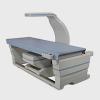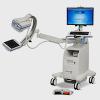A Vision for Women-centric Care

By taking a women-centric approach, we can truly make a difference to women’s healthcare: giving them confidence and knowledge so they can take control of their health.
For too long, there has been a one-size fits all approach to women’s healthcare, which does not consider the individual nature of women’s physiological, emotional, socio-economic and practical needs. This has been exacerbated by too few female voices involved in forming policy and health related decision making at the highest level. We believe there is a path to reducing this inequality in healthcare.
A vision for women-centric care
The impact of national screening programmes cannot be overstated when discussing breast and cervical cancer mortality rates. It is a simple truth that in most cases, the earlier cancer is detected, the better the outcome. However, when the invitation to attend screening arrives or the calendar reminder pops up, it can provoke many different feelings, from heightened anxiety to indifference.
Giving someone ownership without burdening them is a delicate balance, but we need to strive for this to engage women and get them through the initial mental hurdle of booking/attending their appointment. After all, you can have the most efficient and accurate technology possible, but it is rendered obsolete if you have no one to screen.
When leading a busy life and juggling responsibilities, making time for a screening appointment can seem like just another task on a never-ending to do list. Making screening appointments as easy and as simple as possible should be a priority for healthcare systems. The Guidelines Development Group for the European Commission Initiative on Breast Cancer (ECIBC) has recommended using a letter with a fixed appointment date and time when inviting women for screening to remove the burden of diary management,1 which is a useful first step, but there are other measures that can be considered
Quote from Tanja Brycker
"Women are the cornerstone of our families, societies and economies – we owe it to them to ensure they are listened to, and their access to healthcare is as personalised and as innovative as possible."
















